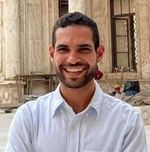In the movie A Beautiful Mind (2001), John Nash sits with his friends in a bar when a beguiling blonde enters with her girlfriends. One of the boys playfully recalls Adam Smith’s lessons that every man should pursue his own self-interest since “individual ambition serves the common good.” Fear of competition amongst the friends, for this boy, is an erroneous instinct — in short, every man should offer the blonde a drink.
Nash, however, has an epiphany and dismisses his friend’s idea, saying, “Adam Smith needs revision.” Nash explains that if all boys pursue the blonde, they will obstruct each other, and not a single one will win her. Then, when she rejects them all, the boys won’t be able to pursue any of her girlfriends either because no girl wants to be second choice. Nash goes on, “But what if no one goes for the blonde? We don’t get in each other’s way, and we don’t insult the other girls. That’s the only way we win.”
"Every man for himself, gentlemen," says one of Nash's friends.
Although he inaccurately explained the Nash equilibrium as a part of his role, Russell Crowe nonetheless won an Academy Award for portraying the great mathematician. The notion that collective decision-making yields a better outcome for everyone has lived on in the psyche of the film’s audience. The scene inspired me for years after I first saw it, just not in the context of picking up girls in bars.
Undergrad: Uncertainty
Outside of Hollywood movies, I was exposed to game theory once more during my junior year in my Artificial Intelligence class. In Gameplay, researchers create intelligent agents that play against each other in strategic games like chess and World of Warcraft. These intelligent agents enumerate all possible actions in a game and generate a game tree comprising all the game states (the combination of audiovisual and other sensory cues that represent particular phases — states — within a game) with different payoffs for each player.
Researchers then turn to game theory to generate a playbook containing the best response to every move that an opponent in a game can make. The choices deemed optimal by intelligent agents tend to minimize the payoff their opponents can achieve by restricting the choices their opponents can make. This pattern has been captured in the Minmax algorithm, which, when applied, can turn playing complex games into enormous, sometimes seemingly infinite, search problems.
After graduation, I had to make many life-altering decisions, like investing my money and finding a wife. To navigate these responsibilities, I learned about decision theory, the theory for making optimal decisions. It turns out that, unsurprisingly, we're incapable of avoiding irrational behavior, regardless of how much we consider ourselves rational beings. The Ellsberg paradox, for instance, demonstrates that decision-makers are doomed to favor options that deliver smaller utility if the risks are clear and avert choices with ambiguous risks even if they offer much higher utility!
I started going to the library and reading its collection of magazines and journals. I was interested in economics and mined these publications for an expanded education in monetary policy, financial economics, and productivity. With regard to monetary policy, I familiarized myself with the implications and, of course, the false indications of the yield curve, as well as how the curve affects stocks and explains the state of a whole economy. I read about how the stock market, in return, affects the state of the economy as a marker of confidence.
Productivity is a major factor in economic growth. In light of this critical relationship, I found it counterintuitive that people frequently work in professional roles that leave them neither personally enriched nor capable of producing any economic value. In search of some kind of explanation, I came to learn about Parkinson’s law, which states that tasks expand in a bureaucracy to fill their allotted time, no matter the quantity of work to be completed. I also learned that this inefficiency is aided by unavoidable manifestations of the Peter Principle, whereby the inexperience of newly promoted professionals and their inability to upskill necessitates their stagnation in particular echelons of an organization's hierarchy.
Grad School: Clarity
I decided to return to school to satisfy my intellectual curiosity. I chose to explore financial mathematics, a niche interdisciplinary field of study that draws knowledge from financial economics, statistics, and game theory.
In one financial economics class, I learned about financial securities, like options and futures contracts, and theories like the efficient-market hypothesis, which states, somewhat counterintuitively, that no profit can be made from the market because all the information about stocks is already reflected in their prices — new information, inaccessible to all until it materially emerges, is the only element in response to which market prices change. This is why economists have claimed that blindfolded monkeys beat hedge funds. Nonetheless, it seems that the wizards of Wall Street develop trading strategies that are indeed capable of beating the market without the need to rely on powers of precognition.
In yet another game theory course, I analyzed real-world strategic situations involving conflict and collaboration. I studied problems ranging from residency matching and gerrymandering to real-time bidding. I co-authored a paper on why we have not found any aliens despite the ample probability of their existence in our massive universe. Our steadfast ignorance turns out to be the result of a security concern.
Game theory turned out once again to have a huge influence on the development of artificial intelligence. With the rise of computational powers, AI has come even closer to replicating the behavior of real neural networks. The developments have enabled the flourishing of machine learning frameworks imitating intelligence in animals and humans, such as reinforcement learning (RL) and generative adversarial networks (GANs).
In 2015, an RL model, AlphaGo, beat the world champion in Go. The agent trained itself by playing thousands of games and repeating the actions that led to wins while penalizing the actions that led to losses. It constructed a policy, a playbook on how to choose action, using network approximation — an attempt at understanding the core of the game despite its magnificently multitudinous gameplay permutations. GANs, on a similar path of providing incredibly vivid approximations of the real, have brought us into the era of realistic photos or deepfakes. The learning model consists of two neural networks that play a game and try to win: the generator network produces an unreal image to fool the detector network, while the detector network tries to detect a fake image. GANs gave rise to websites like this person does not exist.
Game Theory and the Social Fabric
Most importantly, my second round of game theory classes reminded me of the premise I had absorbed years before from Ron Howard’s 2001 film: social interactions are nothing if not strategic games, described in terms of competition and cooperation. In the scene mentioned above, the movie portrays an instance in which the explanation of a mathematical or strategic game motivates characters not to act selfishly and subsequently enjoy the rewards or endure the consequences of acting on their unselfish considerations.
Regardless of whether the boys win or not, the link between, on the one hand, game theory, an apparently purely mathematical and technical search for wins and losses, and, on the other hand, the social rules that represent our collective and individual values and aspirations, has never ceased to inspire in me a sense of childlike wonder about the secret coherence of our universe. What is really the true nature of the interaction between the purely analytical and the human, the social, and the personal?
Project Nash
The movie’s motif is that genius is never enough. There are aspects of life, such as beauty, love, tradition, wonder, and appreciation, that can’t be explained using science and logic. Throughout my life and my studies, I’ve observed this need for more expansive explanatory approaches through the dichotomy between the objectivity of various theories and how they fit in the chaotic world in which we live. As theories, computations, and calculations prevail, sometimes even leading to profound philosophical insights, they’re not without their vulnerabilities and limitations, which are often overlooked or downplayed.
I started Project Nash to facilitate my exploration and reconciliation of the recurring contradictions between the purely theoretical and the phenomenal that I continually encounter through clarification, comparison, analogies, and story-telling, which becomes an infinitely intriguing challenge. As writing entails breaking down complex topics into discrete ideas that flow through reasoning and form a sound logical structure, it also provides an opportunity to justify positions and explain them to others in light of my own and other really occurring phenomenal experiences.
Now, do you want to learn about inequality, artificial intelligence, or attachment theory?


